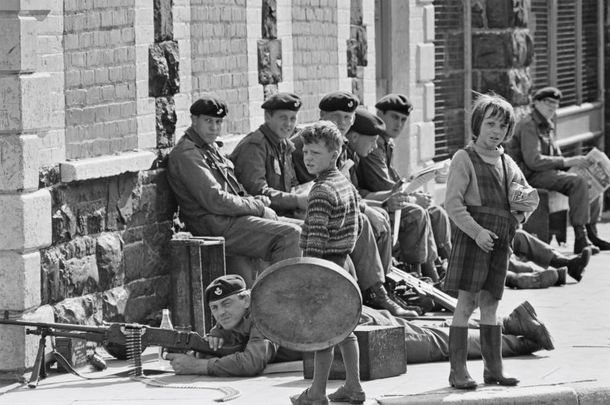The British Army and the Royal Ulster Constabulary (RUC) have been accused of covering up the deaths of children who were shot with plastic bullets during the Troubles.
According to declassified material that has been seen by BBC Spotlight, the British Army knew that it was unsafe to fire rubber and plastic bullets at children but continued to do so.
Other documents also revealed that the RUC used a gun firing plastic bullets that was never fully cleared for use against people.
At least 120,000 plastic and rubber bullets were fired in Northern Ireland throughout the Troubles.
They were invented for use in Northern Ireland to deter people from rioting by hurting them but not killing them.
A total of 16 people were killed by rubber bullets during the Troubles, while a 17th person died from a fall after possibly being struck by a plastic bullet.
Others suffered serious injuries, including brain damage and blinding.
Stephen Geddis, 10, who was the youngest person to be killed by a rubber bullet, was shot by a British Army plastic bullet at the Divis Street Flats in Belfast in 1975.
A recent inquest into Geddis' death revealed that the British Army's 1971 Land Operations Manual stated that rubber and plastic bullets should not be fired at children.
However, the instruction was never passed on to soldiers.
In total, six children died after being shot by plastic bullets during the Troubles.
During street disturbances in Derry in 1981, 15-year-old Paul Whitters was killed by the RUC, who fired plastic bullets at him and a group of youths throwing stones.
A police ombudsman's investigation in 2007 found that the RUC had no justification for shooting the 15-year-old with plastic bullets.
Declassified British Government documents observed by BBC Spotlight have revealed that the plastic bullet used in the shooting was never properly tested for its risks to civilians.
Whitters' family was never informed about the potential danger of the plastic bullet used in the shooting.
"I still want to know all these years later why Paul was shot that night, and I've never got an answer. We do need some kind of an answer," Paul's mother Helen told BBC Spotlight.
Padraig O'Muirigh, who represented the Geddis family at last year's inquest, told the program that there is "clear evidence" of a cover-up.
The British Ministry of Defence did not comment on the matter due to legal reasons.
Former British soldiers also defended the use of plastic bullets, with one soldier describing them as a "lifesaver".
"To say that the plastic bullets should never have been used, I think is a foolish thing to say," said Colonel Richard Kemp, who commanded British troops in Northern Ireland.
"The plastic bullet was a lifesaver, not just a lifesaver for the soldiers whose lives were at risk, but also a lifesaver for people involved in the riots."




Comments